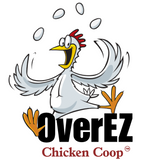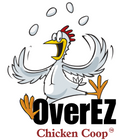TO GET TO THE FOOD AND WATER!
Raising chickens can be a rewarding experience, providing you with fresh eggs, natural pest control, and a sense of connection to your food source. However, one of the most critical aspects of chicken care is ensuring they receive adequate food and water. Proper nutrition and hydration are essential for their health, productivity, and overall well-being. In this blog post, we will explore the importance of proper feeding and watering, the potential consequences of neglect, and practical tips for ensuring your chickens are well-fed and hydrated.
Why Adequate Food and Water Are Crucial
Chickens, like all animals, require a balanced diet and sufficient water to thrive. Proper nutrition supports growth, egg production, and disease resistance, while hydration is vital for digestion, temperature regulation, and overall physiological functions.
Consequences of Inadequate Food and Water
1. Reduced Egg Production: Chickens that don't receive enough food or water will lay fewer eggs. The eggs they do lay may be smaller or have weaker shells due to nutrient deficiencies.
2. Poor Health and Growth: Malnourished chickens can experience stunted growth, weak bones, and a compromised immune system, making them more susceptible to diseases.
3. Behavioral Issues: Hunger and thirst can lead to aggressive behavior, including feather pecking and cannibalism, as chickens become stressed and competitive for limited resources.
4. Heat Stress: Especially in hot weather, insufficient water can lead to dehydration and heat stress, which can be fatal.
5. Weight Loss and Weakness: Chickens without adequate food will lose weight, become weak, and may eventually die if the situation is not corrected.
How Much Food and Water Do Chickens Need?
Food Requirements
On average, an adult laying hen consumes about 1/4 to 1/3 pound (approximately 113 to 150 grams) of feed per day. However, this can vary based on the breed, age, and activity level of the chickens. It's crucial to provide a balanced diet that includes:
- Protein: Essential for growth and egg production. Layer feed typically contains around 16-18% protein.
- Calcium: Important for strong eggshells. Oyster shells or limestone can be added to their diet.
- Vitamins and Minerals: Vital for overall health. Commercial feeds are usually fortified with necessary vitamins and minerals.
Water Requirements
Chickens need constant access to fresh, clean water. On average, a chicken drinks about 1 pint (0.5 liters) of water per day. In hot weather, this amount can double as chickens drink more to stay cool and hydrated.
Feeders and Waterers: How Many Do You Need?
The number of feeders and waterers you need depends on the size of your flock. A good rule of thumb is to have enough space to prevent competition and ensure all chickens have access to food and water.
Feeders
- For a small flock (up to 10 chickens), one large feeder should be sufficient.
- For larger flocks, provide multiple feeders to ensure all chickens can eat without overcrowding. Generally, one feeder per 10-12 chickens works well.
Waterers
- For a small flock, one large waterer is usually enough.
- For larger flocks, provide multiple waterers. As a guideline, one waterer per 10-12 chickens is recommended.
It's also beneficial to have additional waterers in hot weather to ensure all chickens have easy access to water and to prevent dehydration.
Tips for Ensuring Adequate Food and Water
1. Regularly Check Feed and Water Levels: Ensure feeders and waterers are filled daily. Check more frequently during extreme weather conditions.
2. Clean Feeders and Waterers: Regularly clean to prevent mold, algae, and contamination. Dirty waterers can harbor bacteria and make chickens sick.
3. Use Appropriate Equipment: Invest in sturdy, easy-to-clean feeders and waterers. Automatic or gravity-fed systems can help maintain a consistent supply.
4. Monitor Chicken Behavior: Observe your chickens to ensure they are eating and drinking adequately. Look for signs of malnutrition or dehydration, such as lethargy, weight loss, or changes in egg production.
5. Provide Shade and Ventilation: In hot weather, ensure your chickens have access to shaded areas and well-ventilated coops to prevent heat stress and encourage regular drinking.
Ensuring your chickens receive enough food and water is fundamental to their health and productivity. By understanding their nutritional and hydration needs, providing sufficient feeders and waterers, and maintaining a clean and safe environment, you can keep your flock healthy and happy. Regular monitoring and attentive care will go a long way in preventing problems and ensuring your chickens thrive. Happy chicken keeping!

